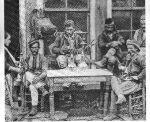History of Rebetika:Rebetika have been around in some form since the turn of the century.In 1923 Greece was faced with the resettlement of over 1.5 million Greeks refugees from Asia Minor.As a result of this,shanty towns grew up around Athens,Pireas and other cities.These refugees brought their music with them and this had the most pronounced effect on the urban music of Greece.Since the emergence of the modern Greek state,the upper and middle classes leaned towards the classical style of European music while at the other end of the social spectrum Greek and Byzantine traditions prevailed.This poor class of workers had a constant contact with the refugees and their culture. The musicians of these two cultures were constantly exchanging musical ideas.Rebetika have always been the music of the poor and the dispossessed, combined different styles of the region and with lyrics describing the joy,the sorrow,the difficulties of everyday life.The best definition of rebetika is given by Gail Holst in her book The Road to Rembetika: "What was special about the rembetika song was the combination between traditional musical forms of the Eastern Mediterranean and the words of the songs, which dealt with the life of the urban underworld and the less reputable elements of the society."Rebetika has its origins in an oral tradition where improvisation played an important role in both the music and lyrics.Songs always started with an instrumental prelude,the taximi where a musician showed his ability.These taximi would set the mood for the songs to come and they would last up to twenty minutes.After this the song would start,often with the singer improvising lyrics,sometimes to a familiar tune,mentioning people in the audience and refering on recent events of local interest.In the 1920's and the 1930's rembetika could be heard in several tekedes of Athens,Pireas and Thessaloniki.These were hash dens where the workers, the unemployed and the manges would meet to drink coffee and enjoy argiles (water pipes) of the best hashish.Sometimes a lone man would get up and dance a zembekiko dance.Three great figures- Batis,Artemis and Stratos-were associated with this early rembetika.Batis was the clown of the group-not a particularly good musician but very popular because of his generocity. Stratos,the group's singer went on to perform later with stars like Tsitsanis and Papaioannou.Artemis was the only member of the group with music education.His father was a santouri player in Smyrna (Izmir).Artemis was adept on guitar and bouzouki by the time he was sixteen.He was using hard drug and in 1934 he wrote the song that could have been his epitaph "The Junkie's Lament".In 1943 in the age of 29 he was found dead in the street outside of a tekes with the bouzouki in his hands.Markos Vamvakaris,the grandfather of rembetika was born in the island of Syros in 1905.His father played the bagpipe in cafes to supplement the family's income.In the age of fifteen he went to Pireas where he learned to play the bouzouki and soon he was playing in tekedhes where he met Stratos,Artemis and Batis.The Pireas Quartet as the four of them became known became very famous and they were attracted huge crowds.His most famous song is Frakgosyriani about a Catholic girl from Syros.He never considered himself a singer,his voice had a gruff metallic style.During the Metaxas dictatorship and the German occupation rembetes had a difficult period:Metaxas oredered the record companies to stop recording hashish songs and make rembetika respectable entertainment.This coupled with the new Greek passion for italian cantades resulted in enormous changes in Greek rembetika.And with that came the minor and major scales of piano, guitar and accordion none of which could play the quarter tones required by the old tradition.As a result the oriental flavour of rebetika started to disappear.Vamvakaris and his brother had a brief flurry in the late 1940's with the famous Kalamata group which included famous musicians like Papaioannou,Hadzichristou,Mitsakis.One of the new stars was Vassilis Tsitsanis.He did not have the usual background of a rembetis.His father was a craftsman who used to play the bouzouki but forbade his son to touch it.Vassilis inherited the instrument on his father death and quicly became adept.He originally went to Athens to study law but soon it became apparent that his future was in music.Tsitsanis made the rembetika sound softer and the words more pleading.With this mellowing he reached a far wider audience than the prewar singers ever had.He was a prolific composer and a master of improvisation.He remained in Thessaloniki and he opened a small ouzo bar where he sung every night. During Greece's occupation he wrote some of his most beautiful songs including Cloudy Sunday,a thinly veiled lament for his desecrated homeland and demoralized countrypeople.He worked with several great singers including Sotiria Bellou and Marika Ninou.In the 50's we have the emergence of the arxontorebetes- the rembetes musicians who got rich.Among them mostly bouzouki players with impressive techniques like Hiotis who added a fourth pair of strings and changed the tuning of bouzouki,thus enabling him to play faster.By this time rembetika bore little resemblance with the bluesy,gasping sound of the 30's.Rebetika is essentially the music of nostalgia and regret;it looses its immediacy in a world of freedom and prosperity.Few attempts for revival the last few years-several groups most notably Ta paidia apo thn Patra-failed.
Try the BEST MySpace Editor at MySpace Toolbox !
